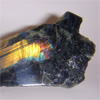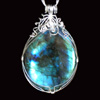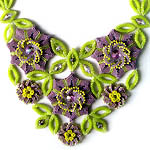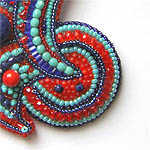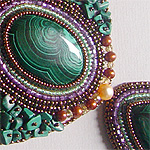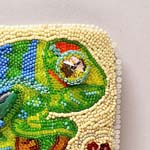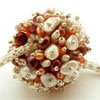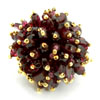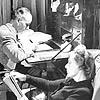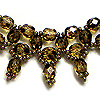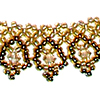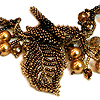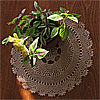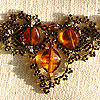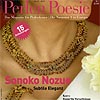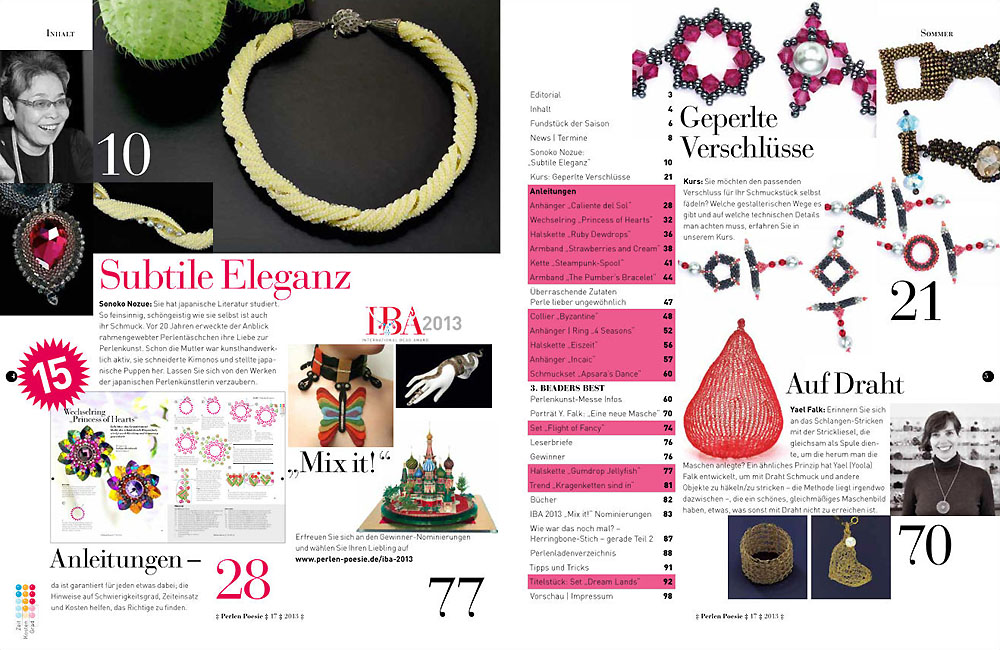May, 2013

From MyLovelyBeads.com TeamRead in the May's issue of MyLovelyBeads.com newsletter:
Labradorite - gem of Northern Lights
Contact us with any questions at
info@mylovelybeads.com.
Fashion Colorworks. Two weeks to go! Making beads from beads - Sharri Moroshok Words and jewelry by Elsa Triolet Workshops at Beaders Best Fair 2013 From lace to bead weaving - R. Rakovska Tips on mastering free-form Perlen Poesie Magazine. Issue 17 May upcoming events Best regards,
MyLovelyBeads.com Team |
Labradorite - gem of Northern LightsLabradorite is a mineral with a "clor play" effect called "labradorescence", it usually occurs as clear, white to gray. Labradorite was first found in 1770 on the Paul's Island near the town of Nain in Labrador, Canada. It has also been reported in Norway and various other locations worldwide: in India, Madagascar, Newfoundland, and Russia. It also has been found in some meteorites. Gem quality labradorite is known as spectrolite; which is a colorless variety, darkened with needlelike inclusions, it is often called black moonstone. Spectrolite is a dark and opalescent blue with a shimmer when the light hits it. It was discovered in Finland during 1940s, and it is also called falcons-eye. According to an Eskimo legend, the Northern Lights were once imprisoned in the rocks along the coast of Labrador peninsula. It is told that a wandering Eskimo warrior found them and was able to free most of the lights with a mighty blow of his spear. Some of the lights were still trapped within the stone, and thus we have today the beautiful mineral known as labradorite. Labradorite which shows an iridescent play of colors is used in jewelry and lapidary items, and as an ornamental stone it has many popular uses such as in decorative clock faces, table and counter tops, facing for buildings, etc.. Traditionally, labradorite is thought to bring good luck. |
||||||||
Fashion Colorworks 2013. Two weeks to go!
The contest continues, but only two weeks to go. You can submit your entries for the Fashion Colorworks 2013 Beading Contest in three categories until June 15. We are looking forward to seeing your amazing bead items in the contest!
Fashion Colorworks 2013 Rules
|
||||||||
Making beads from beads - Sharri MoroshokYou cannot grasp the immensity, and bead manufacturers cannot create anything that the artists would have to work with. So, lampworkers take one of the niches creating custom glass beads. Another sort of custom beads is beaded beads - beads woven from seed beads. Today we'd like you to meet a beautiful artist designing such beads and creating jewelry from them, Sharri Moroshok. Sharri said, "In my previous professional life I was a Librarian. I loved the work but I always felt the presence of an artist within me. I began doing beadwork in 1993. That year, while on a vacation trip with my husband, I was in a bookshop in Sedona, Arizona. I happened upon a book that took my breath away - The New Beadwork by Kathlyn Moss and Alice Scherer. In it I saw pictures of some beaded beads and I became fascinated with this miniature art form. But how to make them??? Back then there were few classes or tutorials. And it was before we could find info about almost anything online. This, as it turns out, was very fortunate for me. I was forced to find my own way to creating beaded beads, developing my own aesthetic. I already knew peyote stitch and so that was what I used and have continued to for 20 years. I also use wood beads as an armature. Working within the confines of this ancient bead stitching technique, taking my cues from the wood bead shapes I could find, and getting color inspirations from the vast and never ending array of seed beads in the world, I have spent all these years exploring and creating beaded beads. I began doing art shows and selling my work pretty quickly. Around 1996 I worked up the nerve to start traveling to the big bead shows. I got asked to teach a lot and so I taught workshops. This was all very rewarding and exciting, but also rather exhausting after a certain number of years. So, in 2007, along with a dear friend and fellow art jeweler (Tana Mclane of CityRusticJewelry.etsy.com), I opened an art gallery in my hometown of Tallahassee, Florida. I loved it! But exactly one year later the bottom fell out of the U.S. economy. There is no more optional than spending for art. After struggling through 2 more years we sadly closed the gallery. But lo and behold I had learned a few more things about the art biz!.."
Full article by Sharri Moroshok
|
||||||||
Words and jewelry by Elsa TrioletBorn Ella Kagan in Moscow, Russia, in 1929 the young writer Elsa Triolet, not assuming about her future glory as a famous French novelist, decided to design jewelry making money for living. This short period in her life is less well known than her youth friendly relations with the aspiring futurist poet and graphic artist Vladimir Mayakovsky who became the greatest poet of the Soviet epoch. In 1915 Elsa invited him home, and the poet fell madly in love with her older sister Lilya, who was married to Osip Brik. Later Elsa was the first to translate Mayakovsky's poetry (as well as volumes of other Russian-language poetry) into French. The late 1920s are also much less known than the time when Elsa's talent as a writer was crowned by the Prix Goncourt (in 1944), France's top literary award, for "A Fine of 200 Francs" (Le premier accroc coute 200 francs) (1), a book of short stories where she described her impressions about her participation in the French Resistance during World War II. Elsa Triolet is the first woman who won the Prix Goncourt! Once Elsa Triolet had made a sufficient amount of jewels to sell, she was helped in business by her life companion and husband, the French poet and writer Louis Aragon, whom she had met at the renowned cafe La Coupole in Paris in 1928. Her creations stood out from other jewelry that has been made at that period by originality and a great diversity of materials and forms: coconuts, paper mache, metal, rhinestones, mother-of-pearl, porcelain, beads, bakelite, leather.
One of the first Elsa's jewelry pieces made out of found objects was sold to Elsa Schiaparelli, and further Elsa Triolet's jewels were intended for Parisian Haute Couture houses; she made jewelry for different couturiers with Louis Aragon acting as the salesman. Elsa spent the money earned from the sales of her jewelry to organize a trip to Russia in 1930 where the couple attended a congress of revolutionary writers in Kharkov (2). During their lives the couple had made several trips to the USSR. Elsa Triolet and Louis Aragon made up a mythical couple being the activists of the French Communist Party as well as high personalities in the literary world until their death (Elsa: 1896-1970 and Louis: 1897-1982). It is also exceptional enough to stress that Elsa, initially called Ella or Allia and nicknamed Wild Strawberry (3) in her youth, had always written in Russian and French languages equally. Elsa kept her diary in French and started writing her novels directly in French in 1937.
Full article "Words And Jewelry By Elsa Triolet"
|
||||||||
Workshops at Beaders Best Fair 2013Beaders Best Bead Art Fair will take place in Hamburg, Germany in August 24-25 and the workshops will begin on August 23. International artists, manufacturers, retailers and beading friends from all over Europe and Overseas will meet at this unmatched event for the third time. The show schedule includes intensive jewelry making program, the classes will be taught by internationally recognized bead artists: Zoya Gutina, Heather Kingsley-Heath, Sabine Lippert, Patty McCourt, Sonoko Nozue, Maggie Roschyk, Miriam Shimon, Anja Schlotman, Olga Vinnere Pettersson, Eva Dobos, Olga Haserodt, Nadja Schmid-Müller, Laura Andrews, Galina Baer, Ute Kluwe, Elena Markovski-Krylova, Eveline Thudt, Svetlana Karimova, Julia Bachmayer, Rumyana Rakovska, Svetlana Sametis and other artists.
The workshop price includes the kit, and the kit includes all materials and findings needed for the workshop, and tutorial (patterns with instructions). Anybody who doesn't finish his work on site will be able to finish it at home.
Workshop "Sunshine Necklace"
|
||||||||
From lace to bead weaving - R. RakovskaWorking with technique all her life and at the same time being an artistic by nature, Rumyana Rakovska from Bulgaria applied her creative skills in lace and bead weaving. We've known Rumyana for a long time and happy to have her in our newsletter! Rumyana said, "My grandmother was great in crafting, but while she was alive and wanted to pass me her skills, I did not show any interest to it (a lesson for the young!). I was studying at the institute and wanted to shine as a "techie" (I've been working as an engineer at the National Palace of Culture for 32 years). I have worked in the men's team, where as a specialist I was appreciated very much and where I felt I was looked down upon. And I finally realized that I would always deal with a silent "technology is not a woman's thing" and the work of men will always get a higher rating. Once going through grandmother's things, I found her laceworks, which delighted me. I wanted to learn making such things - but the grandmother was not there... Gradually, I was fascinated by lace and a step-by-step mastered all available techniques. First I have learned crochet using the German magazine "Handarbeit". Then I went to the courses of bobbin lacework, then tatting. And all the time I did not stop to wonder about amazing lace, which decorated the old grandmother's handkerchiefs... No one could tell me about that kind of lace technique. And by chance I watched a TV show where a craftswoman was making "grandma's lace"! I found the artist, got in touch with her and began to learn the skills of needlelace. By the way, the Dutch queen has a blouse made by a local designer and decorated with my laces in this technique. With the advent of the Internet in my life, I became interested in the characteristics of lace weaving in other countries and spent on various sites on needlework a lot of time. One day I accidentally got on the website www.beadsky.com, and from that moment my bead history began. It was not easy to find a high quality beads in Bulgaria at that time, the shops sold only simple Chinese beads. I have looked at the work of Russian beadworkers and was upset with my ugly items quite unlike their exquisite work... But it was hard to stop! I could not resist and have tried all kinds of beadwork that all my friends made: weaving, embroidery, etc. (except, perhaps, the French bead flower technique, I do not know why, maybe it requires a different state of mind). But with a special attention and enthusiasm I have considered graceful creations by E. Stepnaya and N. Libin in tatting with beads technique - for hours!.."
Full article by Rumyana Rakovska
|
||||||||
Tips on mastering free-form1. Before you start, it makes sense to draw a life-size outline of necklace (bracelet, earrings) of the desired shape. 2. You can fill in the room between outlines of the future item with elements, drawing sketches of their texture and color. 3. The composition should be constructed so that the same shape, texture and color of the details are not side by side with each other. 4. Better to start weaving from an imaginary centerline to the edges. If you create a necklace, it is best to weave one half, and then get to the second. 5. In the process of weaving it is desirable from time to time to put on the item to the sketch to control how it fits in the specified outlines. 6. It makes no sense to follow the original sketch too strictly; it's especially about the texture of the elements. 7. You have to also remember about possible excesses with the thread because when you work with bugle beads, crystal elements and gem chips it can be cut. 8. You can use as a clasp a beaded loop and any element of fantasy: a piece of coral, a stone, beautiful beads, buttons, and so on. Get your imagination wild and be creative - not forgetting about the harmony! |
||||||||
Perlen Poesie Magazine. Issue 17Issue 17 is coming out!
• Subtle Sophistication
Sonoko Nozue: She studied Japanese literature. Her jewelry is as subtle and esthetic as she herself is. Twenty years ago the sight of a frame-woven beaded bag awakened her love of bead art - and the inspiration from her artistically active mother who tailored kimonos and made Japanese dolls. Let yourself be enchanted by the works of the Japanese bead artist. • Beaded Clasps Course: You want to create just the right matching clasp for your piece of jewelry, yourself? Which creative methods there are and what technical details you have to pay attention to - find out about them in our course. • Down to the Wire Yael Falk: Remember knitting that tube with the knitting spool, which at the same time served for coiling the tube around? A similar principle has been developed by Yael (Yoola) Falk for crocheting or knitting wire - the method lies somewhere in between - to make jewelry and other objects that have a nice, uniform loop - something not otherwise achievable with wire. • "Mix it!" IBA 2013: Choose your favorite at www.perlen-poesie.de/iba-2013. • Projects: Great pendants, rings made with really big crystals, necklace with golden leaves, neat bracelets and much more from artists as Sonoko Nozue, Kathy King, Yumiko Watanabe, Helena Tang-Lim, Keiko Wada, Erika Pfister, Met Innmon, Monika Seip, Sabine Reinhardt...
Subscribe to Perlen Poesie magazine
Buy Perlen Poesie magazine in the USA:
|
||||||||
May upcoming events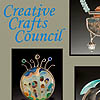
Creative Crafts Council 29th Biennial
May 4 - June 13, 2013 This Strathmore juried favorite returns with a crafty collection of work in a variety of media that's guaranteed to surprise and delight. Extraordinary pieces of fine contemporary craft by regional artists will be on display at the Mansion at Strathmore in North Bethesda. This biennial show is sponsored by the Creative Crafts Council (CCC), which represents artists working in ceramics, enamel, glass, fiber, metals, mixed media, polymer clay, and wood. The public is cordially invited to visit the show in business hours, and also to come and meet the artists and judges in person at the Artists' Opening and Reception on May 16th, when the prize winners of each category will be announced. 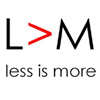
Less is More: Small Works in a Great Space
May 29 - June 19, 2013 This exhibition will include the work of artists from the United States and Puerto Rico. Jurors Joann Moser (senior curator of Graphic Arts at the Smithsonian American Art Museum) and Jack Rasmussen (director and curator at the American University Museum at the Katzen Arts Center) selected two- and three-dimensional works in all media, including jewelry and small sculpture. All works will be for sale. This fundraising event proceeds will benefit the education programs of the Mitchell Gallery. The Elizabeth Myers Mitchell Gallery, located on the campus of St. John's College, is a hidden treasure in historic Annapolis. Accredited by the American Alliance of Museums in 2012 and dedicated to bringing art of world renown to Annapolis since it opened in 1989, the Mitchell Gallery's modern design won a Citation of Merit from the American Institute of Architects. It attracts over 10,000 visitors a year to its museum-quality exhibits, which are of an unusual range and diversity for a gallery of its size. |
||||||||
Note
If you don't see the newsletter properly formatted please click here:
May Issue
|
||||||||
© 2013 MyLovelyBeads.com All Rights Reserved.
If you do not want receive our newsletter and you wish to remove your email address from our mailing list, please click the following link to unsubscribe.



